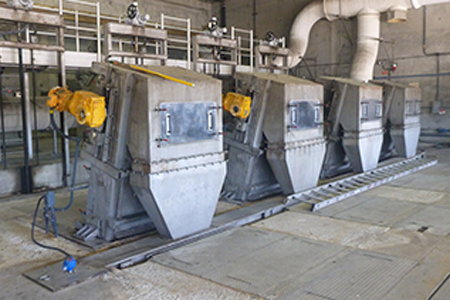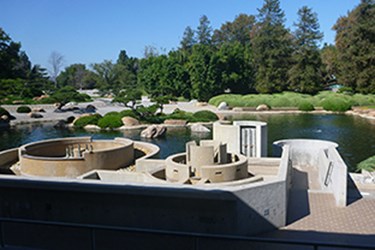8 Years Of Tranquility At Water Reclamation Plant And Japanese Garden, Courtesy Of Headworks Bar Screens
Source: Headworks International Inc.Visitors to the Japanese Gardens above the City of Los Angeles’ Donald C. Tillman Water Reclamation Plant (DCT Water Reclamation Plant) become more tranquil as they stroll along the walkways. DCT is one of the few examples of a City whose engineers have innovatively combined technology with serenity. With over eight years of consistently low maintenance operation of the four Headworks MS1 Bar Screens, DCT operators also have the good fortune to work in a peaceful setting.
The DCT is home to both a wastewater treatment facility and a Japanese garden open to the public all year long. Water is a central element to any Japanese garden and the fact that the water used in the Tillman Japanese garden is reclaimed adds to the overall sense of harmony. In a time of severe drought, reclamation becomes more critical than ever and Los Angeles certainly was ahead of the curve when they designed this facility years ago.
Headworks MS1 Bar Screens rated to handle 36 Million Gallons of sewage per day have been protecting the plant since 2007 where over 25 million gallons per day of reclaimed water is produced. About 2.5 million gallons per day are recycled directly at the plant for treatment processes, landscape irrigation, cooling of plant equipment, air conditioning and other applications. Over 23 million gallons per day are recycled to the three nearby lakes: the Japanese Garden Lake, the Wildlife Lake, and the Balboa Recreation Lake. The remainder of the Plant’s treated water is discharged directly to the Los Angeles River. The plant’s discharge, combined with the outfall from the three lakes, provides a minimum of 20 million gallons per day to the Los Angeles River for support of the river’s riparian habitat.

The City of Los Angeles chose Headworks’ equipment and after 8 years of successful and smooth operation it has proven to be the decision right. Mr. Pritpal Jhaj, Maintenance Supervisor at the plant, explained that before the MS1 Bar Screens were installed at Tillman, maintenance on the old climber screens at his facility was tedious, frequent and hazardous. When maintenance and repairs were required, crew members had to set up fans and don face masks and other hazmat gear, then drop a ladder and climb into a confined space where air quality and other conditions were extremely dangerous. One chore Mr. Jhaj and his team especially dreaded was the required greasing of the climber screens every week!
Mr. Jhaj is extremely delighted that he now has virtually no maintenance issues with his Headworks Bar Screens long after their installation. When asked why he chose Headworks for the project, he said he was looking for equipment that would be trouble free. From the beginning he really liked the Headworks concept of rakes moving along channels. The previous rakes in the climber screens had issues with a system that would misalign and break.
Mr. Jhaj said: “Inspection and maintenance can easily be accessed and completed at the ground level. Workers can easily view activity through observation doors. You can just walk up and see it working.” The new screen design allows for the channel to be fully covered, so no one can possibly fall and get hurt. When asked about the performance of the screens, Mr. Ed Lozon, Maintenance Manager, said: “If everything ran like this screen, the maintenance department could all go home.” They are so pleased with the equipment that they have recommended the system to their sister facilities.

The solid construction of the stainless steel was an upgrade for DCT over the carbon steel of the previously installed models which became corroded in their hazardous environment. The multiple rake system that keeps a constant flow of debris and other material moving along was a strong selling point. Additionally, they viewed the variable drive system as a huge plus: the system automatically slows or speeds up to maintain an appropriate water level.
Mr. Jhaj is pleased that the flow of material from the screen troughs and drain lines is constant, which prevents clogged lines. Another benefit is the patented self-reversing feature that automatically dislodges debris. The installation of the screens was a smooth custom fit to the existing space. The Tillman installation was so well received that the City of Los Angeles bought two large Headworks MS1 screens for the Terminal Island Reclamation Plant in 2014.
